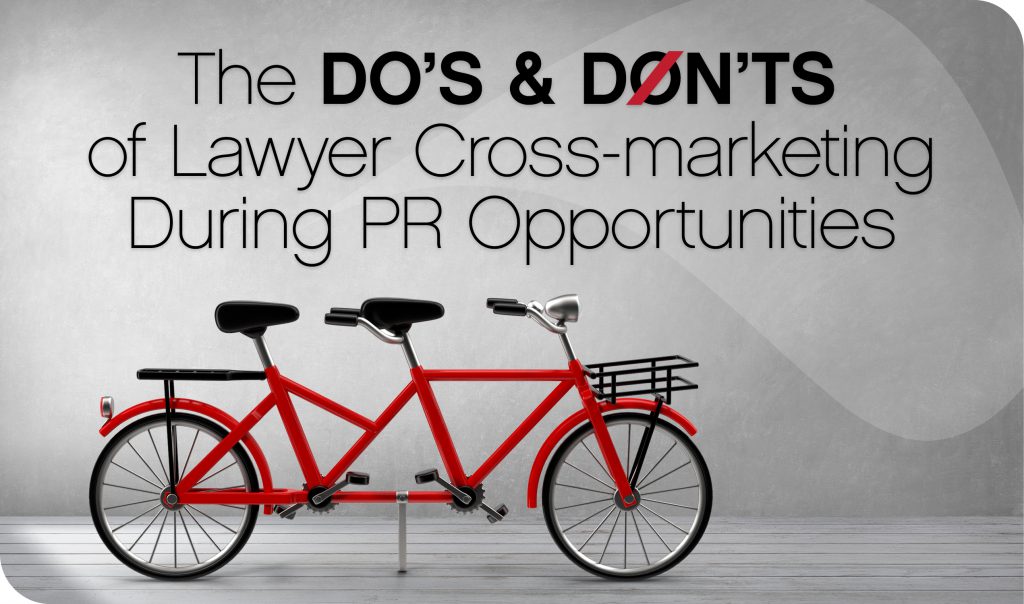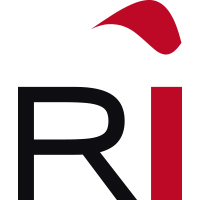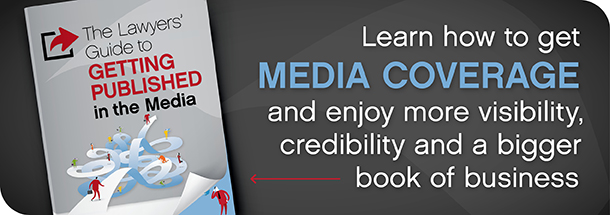The do’s and don’ts of lawyer cross-marketing during PR opportunities

Humor me a hypothetical.
Let’s say your law firm’s publicist secures you a guest appearance on a leading podcast that caters to one of your primary practice areas. It’s the day of the podcast, and you’re three-quarters through an in-depth Zoom interview. Of course, you’re nailing every question and hitting your talking points — all while showcasing your extensive legal experience and knowledge.
As you relax in your chair (or adjust your feet, for you standing-desk folks), a question arises that brings to mind one of your colleague’s recent successes. But you don’t mention it. The host moves on to the following questions, and the banter continues.
Minutes later, as you close out of your Zoom room and throw on a more casual top, some nagging questions cross your mind:
“Should I have talked about my colleague’s case? Did I miss a big opportunity to promote other attorneys at my firm?”
The answer to both, unfortunately, echoes a trite but true phrase known well to those in the legal industry: “It depends.”
In any public relations opportunity a lawyer encounters, it is always important to draw attention to their practices and their firms. After all, what is the benefit of engaging in public relations for lawyers if it does not build awareness about the firm? Taking opportunities to mention other lawyers and their work may just reach a potential client that needs help with a specific issue that falls within the capabilities of the firm.
However, there is always a right way — and an off-putting way — to go about this. Lawyers who approach each PR opportunity with a selling posture will only risk coming across as “salesy.” No podcast listener, article reader or conference attendee wants to suffer through a hard-sell pitch.
Lawyers must be aware of the scenarios where it would be appropriate to talk up the services of their colleagues and when it would be best to stick within the parameters of the media opportunity. At the same time, if a reporter is open to discussing what an attorney’s firm or colleagues have done, they should be ready to seize the opportunity.
By working with a PR agency with deep legal industry expertise, law firms can leverage different ways to effectively, ethically and professionally promote their services. Some options they can pursue are below.
Putting forward more than one attorney per pitch or speaking opportunity
The most effective way to bring attention to a firm — and the expertise of the people within it — is to do so subtly. One of the most effective ways we have seen firms accomplish this in our pitching is by doing a “paired pitch” with multiple lawyers or law firm stakeholders around a single topic. By bundling various people from a firm into a single media opportunity, readers and listeners can receive multiple authentic viewpoints on an issue, allowing the attorneys to prove the value of their experience and the firm’s capabilities in real time.
Having co-authors attached to an attorney piece is a practice many legal publications welcome. It can also be a fantastic way to boost the profile of more junior attorneys in whom a firm sees partnership potential — particularly if they pitch those lawyers to complement more established partners. By riding on the coattails of more experienced lawyers, junior associates can ease themselves into the publicity elements of the rainmaking process, while benefitting from the safety net of a more seasoned partner. We generally recommend that associates stick to writing articles unless they are very senior.
This tactic is especially effective when approaching podcast hosts with two partners as potential guests. In a medium that lives on the art of conversation, multiple podcast guests on an episode can add interest, fun banter and enhanced dialogue. It also can create natural opportunities for guests to discuss the work of their colleagues and shared work experiences, especially during the early icebreaker stages of most interviews. By having multiple voices sharing multiple perspectives on topics, listeners will see for themselves the breadth, depth and diversity of legal perspectives a firm can bring to resolving their matter.
In addition, this same strategy can work when preparing and submitting attorneys for speaking engagements. Having multiple lawyers from the same firm on a panel can be a solid way to showcase its talent and capabilities. It can also help show a lighter side of the firm, especially if the lawyers have built-in chemistry, can offer complementary perspectives and can engage in light-hearted banter.
Suggesting colleagues as interview sources
While a lawyer should be well-versed and prepared for a podcast host’s questions, rapid-fire quote requests from journalists can be a different story. Perhaps a reporter is looking for expert insights about a case an attorney is unfamiliar with or an angle outside theirpractice area focus. While the original attorney the reporter contacted may not be the right fit, it does present an ideal opportunity for that lawyer to introduce another colleague who can help.
This scenario can be an excellent way to help junior partners gain more experience with media opportunities and fast-track their entry onto a journalist’s speed-dial contact list. Referring other lawyers to inquiring reporters can also be a boon for established partners interested in expanding their reach into practice areas where they want to develop more business.
Again, this strategy is a great example of how a law firm can subtly promote the capabilities of multiple partners and associates without coming across as self-serving. Instead, by offering helpful and experienced colleagues as alternative sources, the firm provides value to reporters — all while establishing it as a first-call source for quick soundbites under a deadline crunch.
This tactic isn’t necessarily limited to interviews for breaking news stories. It can be as helpful in setting up interviews with podcast hosts, speaking engagements and more. In the end, media contacts and conference planners simply want to find the right legal sources and speakers tand will be grateful for any lead or connection that will help.
Working in references to the firm’s capabilities during interviews
Of course, lawyers should also wax poetic about their firm and colleagues during interviews — so long as a reasonable opportunity presents itself. Going into an interview opportunity solely to advertise a firm is never a good idea. Legal audiences, which usually consist of potential clients and referring attorneys, have a very low bunkum meter.
Whether a lawyer should pursue this publicity path comes down to the type of media opportunity. Is the reporter requesting a quick soundbite or quote around a recent decision or other breaking news topic? If so, discussing a colleague’s work around a similar case is a no-no.
However, suppose a publication is doing a feature about a lawyer or about the firm in general. In that case, it’s fine for that attorney to reference a colleague’s cases and accomplishments. Even the icebreaker portion of most interviews can be a good time to share a fun, on-message anecdote. The size of the lawyer’s firm or department should be considered; discussing the cohesion of various individuals in a six-partner firm is much easier than in a hundreds-strong legal department. These opportunities give lawyers a fun way to talk about their colleagues and firm culture. The quotes attorneys give can also serve as valuable collateral for marketing and recruitment.
With that said, the firm must agree to clearly articulated messaging and talking points that all its attorneys will follow. What does this firm do well? How does it compare to competitors? Having a united front around these questions will reduce the risk of self-defeating messaging and ensure each attorney hits on key points that help the firm distinguish itself.
Talking up the contributions of lawyers in shared cases
Suppose a reporter asked a lawyer to address a matter that multiple lawyers worked on. In that scenario, would it be acceptable for that lawyer to talk up their colleagues? Of course! It would be appropriate to mention significant colleague accomplishments and provide information about each lawyer’s role. In doing so, the lawyer can give concrete examples of the achievements of their colleagues in a context that makes sense, giving audiences something substantive to consider about a firm’s capabilities. Framing accomplishments as stories can help prospective clients and referral sources better engage, remember and relate to specific firm members and better understand a firm’s collaborative culture. Likewise, press releases and pitches about case wins, closed transactions, and the like should always include the names of lawyers involved.
Any attorney considering this route during an interview should focus on lawyer contributions that materially advanced the client’s position or helped make a definitive outcome on a case. A stellar second-chair performance or out-of-the-box motion strategy would fit nicely.
Cross-marketing may only be ideal in some scenarios and will depend on the type of opportunity and, in the case of interviews, the exact context of the conversation. However, when an attorney does cross-marketing the right way, it can turn a single media opportunity into a dividend-paying chance to highlight the capabilities and strengths of their firm and its deep bench of attorneys.









